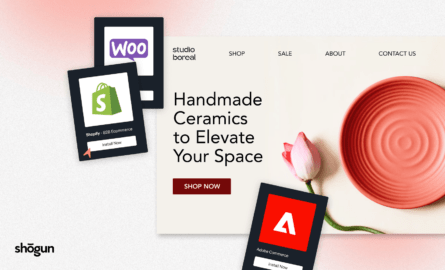Is Building an Ecommerce Mobile App Worth It?
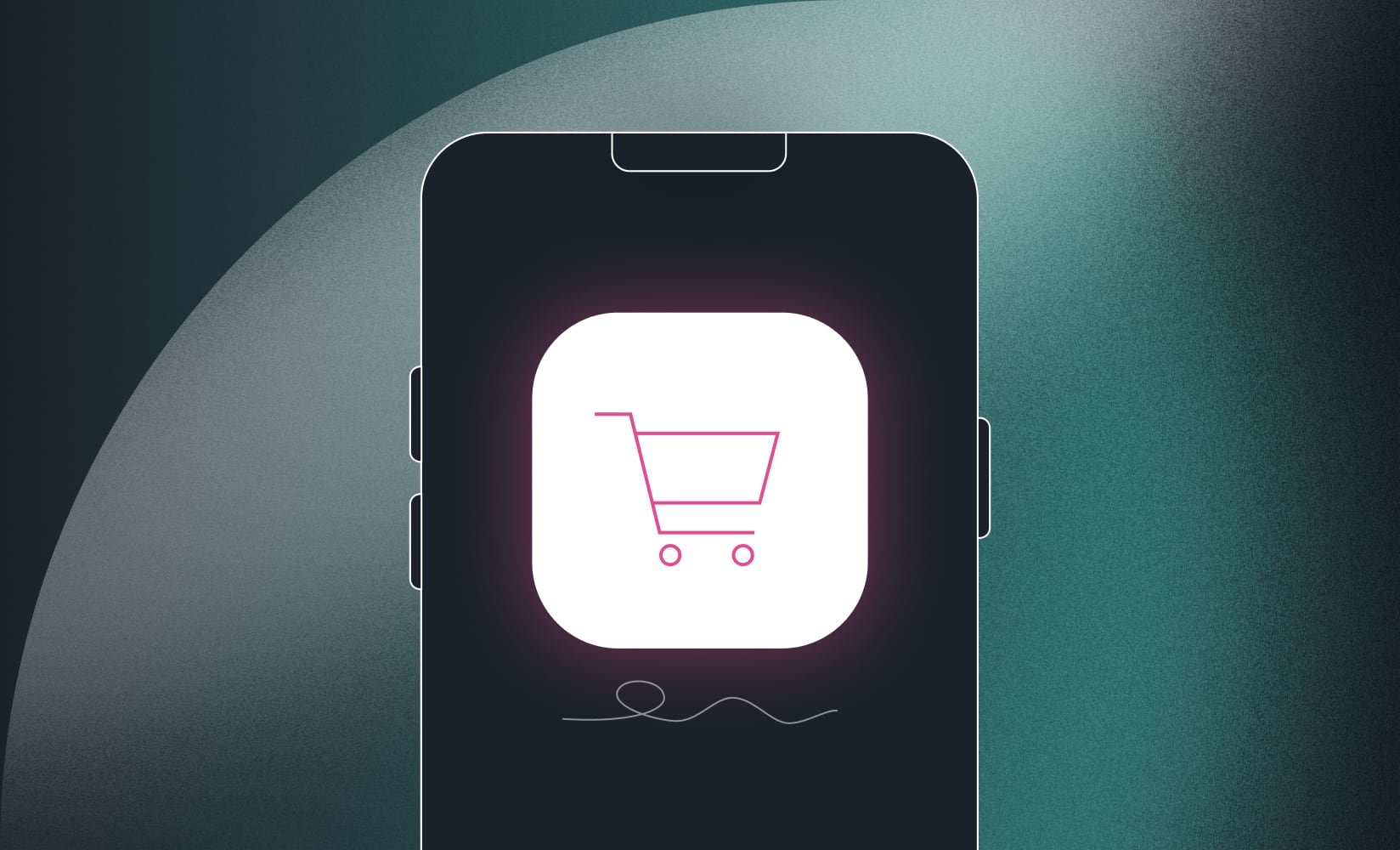
Many scaling ecommerce brands are still weighing the pros and cons of building a dedicated mobile app. After all, mobile apps are installed directly on shoppers’ devices and have worked great for brands like Warby Parker, Abercrombie & Fitch, and Adidas.
A native app is like your brick-and-mortar store—but on a customer’s device home screen. It can be pretty valuable real estate to get that App-store download.
But, despite the benefits an ecommerce mobile app brings to the table, are they worthwhile to create?
Should your brand invest in one? Or is there a better alternative?
While many may argue that mobile apps are a terrific opportunity, we say there’s a better option: Progressive web apps (PWAs).
If your goals are to improve site speed, UX flexibility, customer experience, and conversions, PWAs may be what you’re looking for.
We’re sharing what you need to know about building a mobile app and if this route—or something different—is right for you.
Ecommerce mobile app stats
To learn more about why ecommerce brands consider building dedicated mobile apps, it helps to look at the state of mobile commerce:
- It’s expected that by 2025, more than 10% of all retail sales in the US will be via mobile commerce.
- 66.9% of the world’s population uses a mobile phone. That’s 5.34 billion people!
- Nearly 50% of all web traffic comes from mobile.
It’s safe to say mobile shopping isn’t going anywhere and you need a mobile commerce strategy. However, does the steady increase in mobile usage alone justify an investment in a mobile app for your shoppers? We’ll get into this shortly, but first….
#cta-visual-fe#<cta-title>Create an app-like ecommerce experience—without the app. <cta-title>See how your brand can benefit from progressive web app technology via Shogun Frontend. Learn more
Examples of the best mobile apps for ecommerce shopping
Ecommerce mobile apps certainly have come a long way over the years—especially since the Apple App Store launched back in 2008:
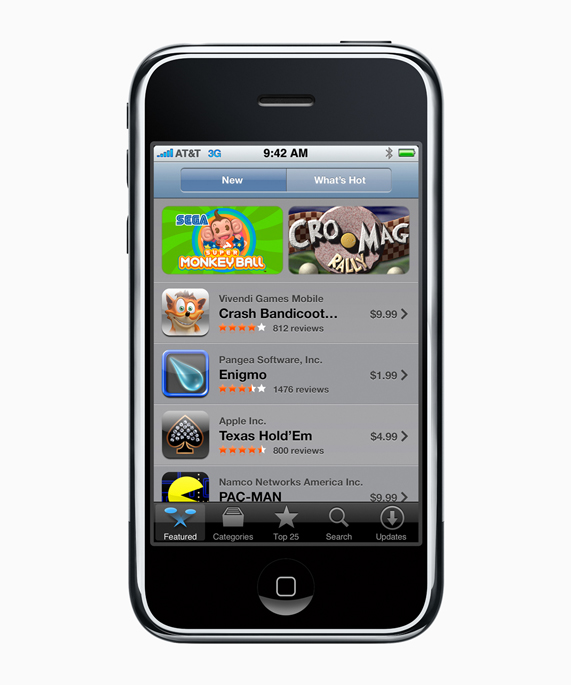
A brand’s dedicated mobile app—like Target or Walmart’s—allows customers to shop where and when they want from a dedicated, branded experience on their devices.
Specifically, these apps are extensions of the online shopping experience. Compared to your store’s website, native apps are special or desirable in that they:
- Are downloadable (accessible offline)
- Offer push notifications
- Can make use of mobile device features like calling, camera, etc.
Let’s look at a few of the best ecommerce mobile apps we’ve seen from brands.
GOAT
Sneaker and apparel brand, GOAT, makes shopping for a variety of products feel luxurious and engaging.
What makes this a great ecommerce mobile app:
- The unique app interface is futuristic and slick (like the brand) without being confusing
- High-resolution images throughout the app give context and convey quality
- Sleek design elements—like a size toggle instead of a drop-down menu—add to the sophistication of the app experience
AE + Aerie
Apparel brand, American Eagle Outfitters’ mobile app allows customers to shop for products from both brands—AE and Aeria–all within one app experience.
What makes this a great ecommerce mobile app:
- A simple, yet engaging interface makes it easy to use
- Product hierarchy and organization allow for quick product discovery
- Ample search filters and clear product imagery help shoppers find exactly what they’re looking for
Nuuly
Curated fashion rental platform Nuuly’s sleek mobile app helps customers build up their closets with clothes they’re obsessed over.
What makes this a great ecommerce mobile app:
- An organized search hierarchy and clear interface make it easy to browse clothing, save items for later, and add products to your monthly rental order
- Editorialized sections on the home screen offer tons of inspiration for shoppers
- Track your order, manage monthly rentals, leave reviews, and even purchase items all from one tab
The top features to build into an ecommerce mobile app
To ensure your mobile app is appealing, it’s got to go beyond the capabilities of your desktop store.
Along with UX and content organization, native mobile apps need to offer a few things that make the download for shoppers feel worth it.
Let’s look at a few baseline ecommerce mobile app features you’ll need to include:
- Product filtering and sorting: Customers should be able to easily browse products by category or other filter types to make for seamless shopping.
- A dedicated shopping cart tab: A separate cart tab helps customers see what’s in their cart and makes it easy for them to find it at any time while using the app.
- In-app order/return tracking: Like the dedicated shopping cart tab, adding a section where customers can track their order or return status increases transparency and brand trust. It also makes for a great customer experience.
- Ample product visuals and details: Including high-resolution imagery and detailed product descriptions in your in-app experience is critical. Product visuals that show different angles and contexts add to the shopping experience.
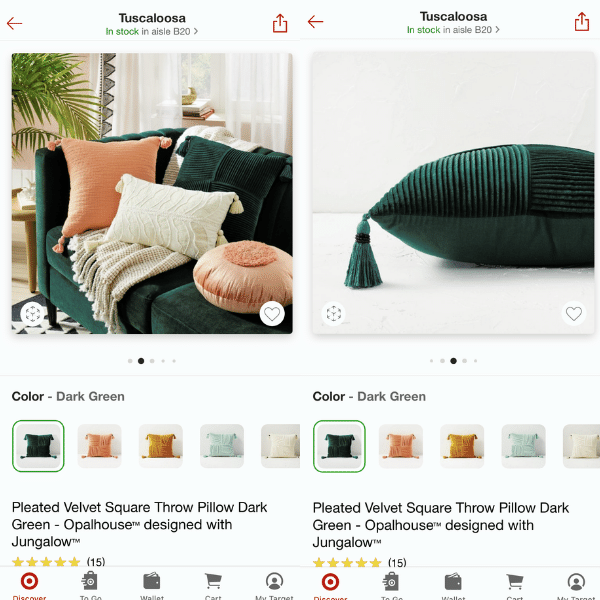
- Loyalty points tracker: If customers know how many points they have, they’re more likely to use them. In fact, 62% of customers spend more money if they have a paid loyalty card with a brand, so making it easy for customers to see this info and manage their account can boost conversions.
- Features that go above and beyond: Adding features that will make for a better customer experience—like Target’s virtual reality shopping feature—is a great incentive to not only download your app but to keep it installed.
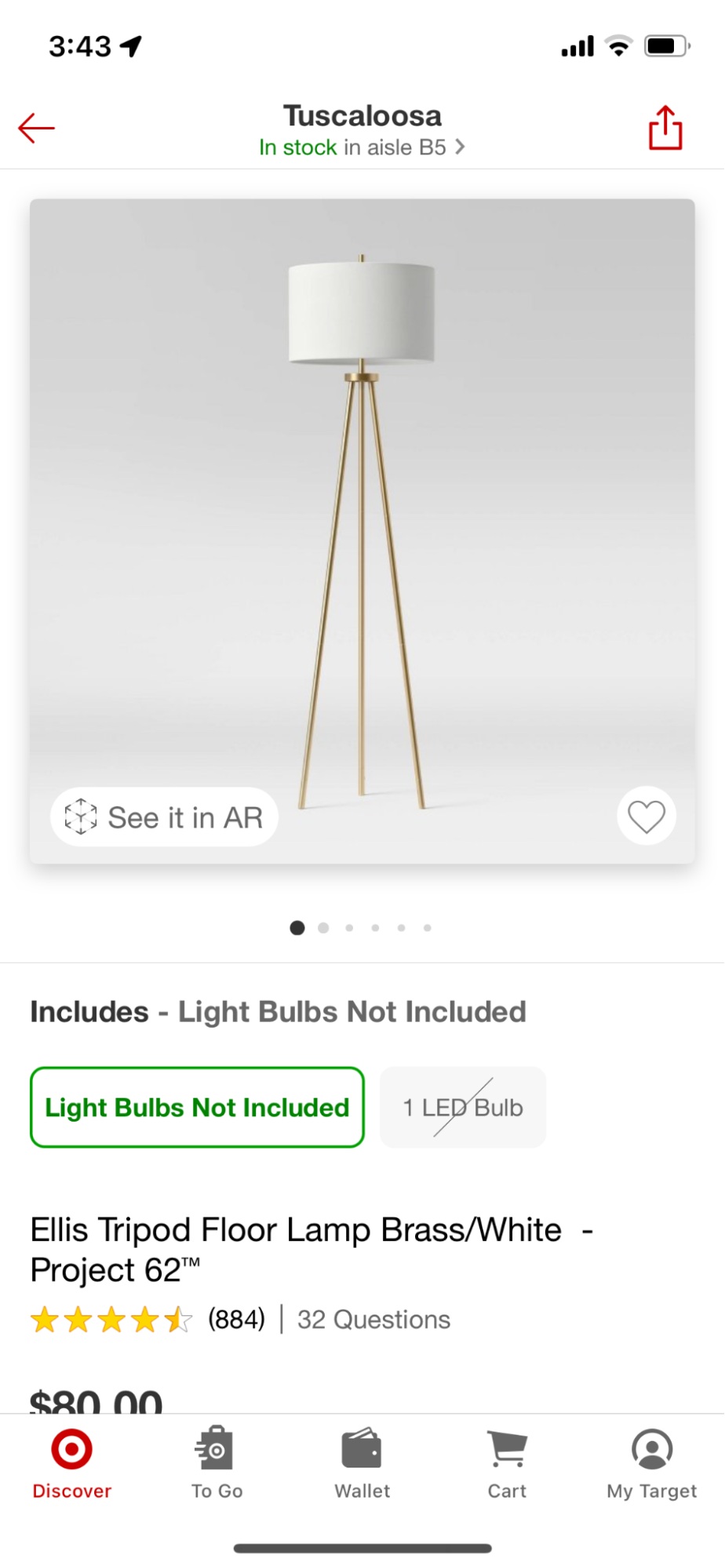
The benefits of mobile apps for ecommerce (why brands consider building them)
Customers value flexibility when shopping online. And a big reason why brands look to ecommerce mobile apps is that they offer a way to connect with customers on their terms.
Let’s look at the benefits of building a mobile app for ecommerce brands:
1. A fast and convenient shopping option for customers
A whopping 62% of shoppers say they like using mobile apps because of their convenience. On top of that, 57% of shoppers say they choose ecommerce mobile apps over websites for their speed.
This is no surprise since brands with traditional ecommerce websites often have to compromise on site speed or dynamic design.
However, as more brands turn to progressive web apps (PWAs) to build their ecommerce experiences, the need to compromise is becoming a thing of the past (more on this later).
2. Boost your loyalty program engagement
Mobile apps are the preferred method for 52% of customers with loyalty accounts with a brand.
If your ecommerce mobile app makes it easy for shoppers to check their balance and redeem points, that’s a huge incentive to download, for example:
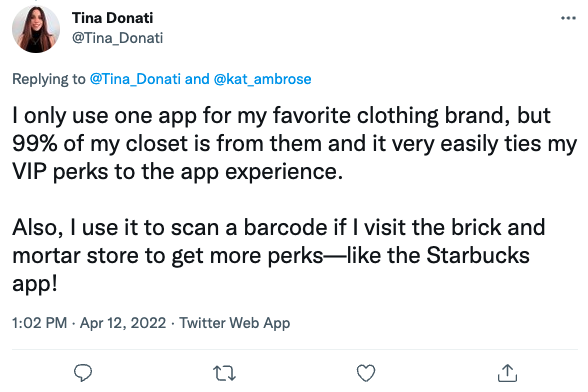
Building an ecommerce mobile app designed with your loyalty program in mind can motivate price-conscious shoppers to make repeat purchases.
3. Push notifications offer a direct line to customers
What better way to notify customers about an upcoming sale than with app push notifications?
They’re a great way to boost your retention rate—brands that use push notifications see an app retention increase by 190%.
With push notifications, you can communicate directly to customers and encourage them to check out your sale in-app rather than relying on other channels that might not be seen right away. It’s a direct line to your audience, on individuals’ previous devices.
How to build an ecommerce mobile app
Like a website, a lot goes into building an ecommerce mobile app. On top of designing, developing, and testing your app, there are other factors to consider like ongoing maintenance, content management, and more.
As you’ll likely outsource app development, this will be factored into your cost as well.
For our purposes, the app-building process with a web design agency looks like this:
- Conduct market research: In this phase, you’ll want to understand the current pain points among your competitor’s apps. Plus, this is a great time to understand if developing a mobile app is the right solution for your brand or if you should consider something else—like a PWA.
#cta-paragraph-fe#If your motivation for building an ecommerce mobile app stems from frustrations with your site, a PWA offers design and UX flexibility without performance tradeoffs. Using a unified frontend platform like Shogun Frontend means the best-in-breed technology powers your PWA, so you never have to settle for speed over creativity (and vice versa).
- Mockup your app: Next, you’ll sketch out how your app will look and function ahead of development in a mockup and wireframe. You’ll work out how the app will look along with which features you want to include.
- Create a marketing plan: You’ll need to figure out things like how customers will learn about your app, how you’ll encourage downloads, and more. A marketing plan ensures your app stays top of mind among your customers on launch day and beyond.
- Develop your app: Once your mobile app plans are ready, it’s time to develop. Your dev partner will begin building your app—likely in phases. This part of the process usually takes the most time. The agency team will need time to write the code, QA it, and review their progress with your team.
- Optimize your app with customer feedback: You’ll likely want to make changes as customers begin to use your app after launch. With your app development partner, you can determine which changes should be made and when based on your agreement and budget.
The cost of building an ecommerce mobile app
How you approach building your mobile app—plus the features you want to include—will determine the cost of your build.
Here are a few factors that will help you gauge the cost:
- Design and development
- Security infrastructure (like your app’s servers, data storage, and content delivery network)
- Testing
- The web design agency you partner with
Generally speaking, ecommerce mobile apps cost anywhere from $30,000 – $700,000+.
The more complexity, the more your cost is going to increase. That’s why it’s essential to get really clear on the purpose of your app ahead of anything else.
How long does it take to build an ecommerce app?
Similar to calculating the cost, how long it will take to create your ecommerce mobile app will depend on:
- The scope (what kinds of features/functionality you want)
- Your budget
- Your agency partner
It can take three to six months to build a mobile app. Plus, you have to factor in delays along with QA and testing.
#cta-visual-fe#<cta-title>Create an app-like ecommerce experience—without the app. <cta-title>See how your brand can benefit from progressive web app technology via Shogun Frontend. Learn more
The potential downsides to building a mobile app for your store
While mobile apps are expected to generate over $935 billion in revenue by 2023, even with their popularity, there are quite a few drawbacks to consider:
Difficulty sparking app engagement
Ecommerce mobile apps tend not to be engaging outside of their intended purpose: Shopping.
As a result, brands have difficulty finding ways for customers to use their mobile app outside of buying products. As of 2020, ecommerce mobile apps are seeing a decline in the number of downloads within the first 12 months of being live.
Too many push notifications
In an attempt to increase app engagement, some brands will overdo it with push notifications, which can backfire.
39% of customers will turn off all notifications for an app if they receive too many, and 42% will change the settings of the app.
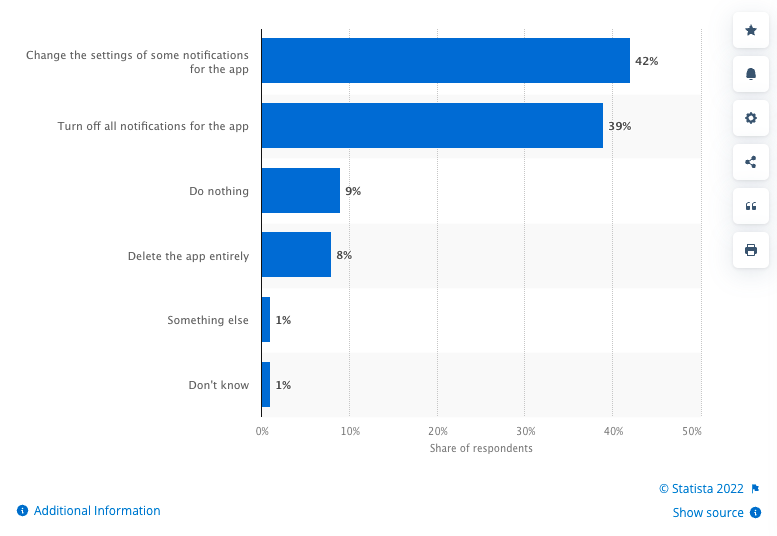
Challenges with uninstallation
The reality is that most people don’t like having too many apps on their smartphones—whether it’s a personal preference or the storage on their phone only allows so many apps.
In fact, the top reason why people uninstall apps is lack of use.
Not only do brands need to encourage app use but they need to worry about uninstallation, too.
Mobile shopping doesn’t always = mobile app use
While mobile device use is up—many shoppers flock instead to another aspect of mobile shopping on devices that doesn’t require a download: shopping via social commerce features on their devices, like Instagram Shopping. In fact, social commerce sales were estimated to surpass $36 billion in 2021 in the US, with more than 35% growth.
There are tons of avenues to explore for enhancing your presence on Instagram, Tik Tok and other popular social shopping channels ahead of deciding to invest in an app. If you haven’t considered how your store is making shopping simple on social shopping channels, this can be a better first priority!
Alternatives to building a native ecommerce app
There’s no question consumers will continue to use mobile as a primary means of shopping. But if mobile experiences are only getting better as technology evolves, is there a need for brands to build a separate app experience?
Progressive web apps are an excellent alternative to ecommerce mobile apps for several reasons:
- Accessible offline and to more people
- Reduced data requests mean less dependency on servers, making them lightning-fast
- Not limited to a particular device or browser (unlike the different versions of mobile apps needed for iOS and Android)
- Discoverable by search engines, which helps with SEO
- Usable in a browser, so it doesn’t need to be downloaded
- Offers an app-like browsing experience, giving you the best of both worlds
Plus, PWAs can be added to a device’s home screen and can even send push notifications to shoppers who enable them.
What’s more, you don’t need to tap into your dev resources every time you want to make an update. If you choose to build a PWA with a unified frontend platform like Shogun Frontend, non-technical team members can make updates to the site (without developers!), keeping your team nimble.
Is an ecommerce mobile app right for your brand?
Ecommerce mobile apps are an enormous undertaking, and they don’t guarantee the results you want.
Consider headless commerce via PWA to get that smooth, speedy mobile-like experience on any device—without managing another channel.
#cta-visual-fe#<cta-title>Create an app-like ecommerce experience—without the app. <cta-title>See how your brand can benefit from progressive web app technology via Shogun Frontend. Learn more

Kaitlyn Ambrose
Kaitlyn works on all things content at Shogun. ⚡


